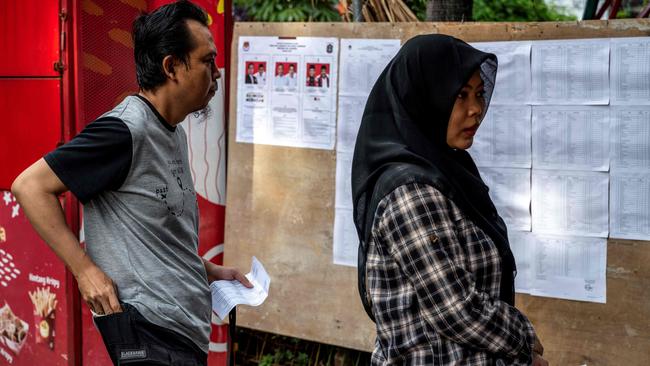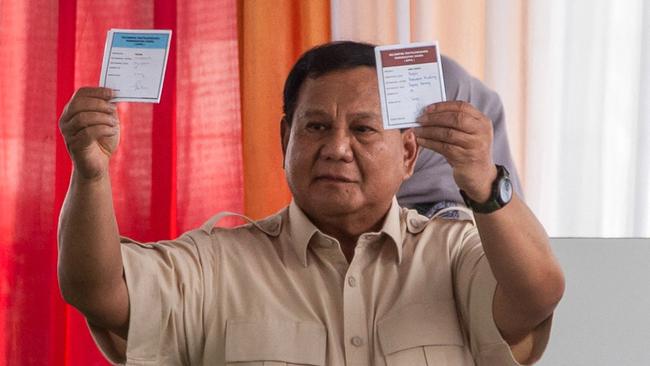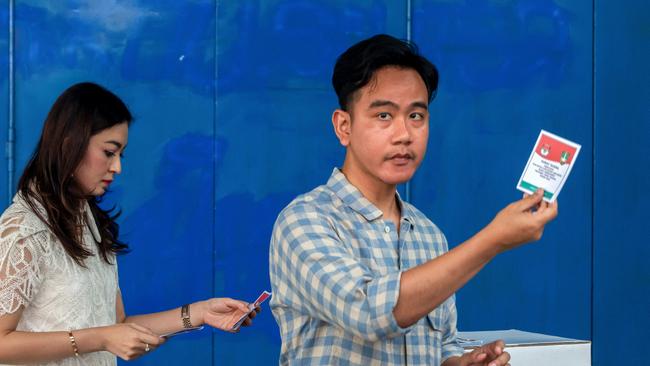Indonesia’s grand scale democracy an exercise in shrinking choice
The massive regional elections are an early litmus test of the popularity of new president Prabowo Subianto as well as that of his erstwhile political backer, Joko Widodo.

Indonesia held its largest ever elections on Wednesday, with more than 200 million eligible voters electing 545 local leaders in what critics say will be one of the country’s least competitive thanks to mass political collusion.
Across the country, prior agreements brokered between coalitions of political parties have all-but predetermined the election result in multiple contests, squeezing out popular candidates in some races and reducing the ballot to one-horse races in others.
In at least 37 regions just one candidate backed by all 11 national parties is contesting, as the new government of President Prabowo Subianto seeks to consolidate its power and eradicate opposition.

This year’s regional elections, the first time Indonesia has held simultaneous polls for governors, mayors and regents, come just two months after parliament tried to overturn a constitutional court ruling that sought to broaden the range of candidates by lowering the eligibility threshold.
The attempted parliamentary coup, as some analysts have described it, triggered nationwide protests that forced MPs to publicly back down even as backroom political agreements were forged in earnest aimed at engineering election results.
“It’s the largest-scale regional elections Indonesia has ever had but at the same time the parameters of contestation are shrinking,” Murdoch University Indonesia expert Ian Wilson told The Australian.
“Parties are now making deals among themselves and really pushing Indonesia towards autocratic electoralism, in which there is a fair election process but the options for voters are narrowing.”
The effect of that reverberated across Jakarta polling booths on Wednesday where a normally exuberant voting public expressed scant enthusiasm for candidates.
“I don’t really know the (candidates), who they are or their programs, so I just voted for the one I was most familiar with,” Abdul Rosyid, 46, said after voting at an East Jakarta polling booth.
Jakarta retiree Sarmili said he too was unfamiliar with the candidates and had “not followed their programs or visions closely”.
Despite the immensity of Wednesday’s elections, analysts have focused largely on just two – the contest for governor of Jakarta and Central Java – where ruling coalition backed-candidates face tough competition from rivals endorsed by the country’s only national opposition party, former president Megawati Sukarnoputri’s Indonesian Democratic Party of Struggle (PDIP).
Both races are seen as a stepping stone to the presidency, and an early litmus test for Mr Prabowo’s popularity as well as that of his erstwhile political backer, Joko Widodo.
The former president, known as Jokowi, launched his political career in his central Java home town of Solo before winning the Jakarta governorship and using it as a launching pad to the presidential palace.
His eldest son, Gibran, also briefly served as Solo mayor before successfully contesting February’s vice-presidential elections as Mr Prabowo’s running mate.

Jokowi’s son-in-law Bobby Nasution is favoured to win the governor’s seat in North Sumatra.
“This is a test case for Jokowi. His influence was previously tied to his role as president. Now that he’s out of office, we’ll see if his ‘Jokowi effect’ is as strong as before,” said Wasisto Raharjo Jati, a political researcher with the National Research and Innovation Agency.
In Jakarta, where a push to field Jokowi’s younger son Kaesang was foiled by the Constitutional Court, a win for the favoured PDIP-backed candidate would be a blow to the Prabowo administration.
Similarly in Central Java, where the government-backed former local police chief is facing off against a popular PDIP-supported ex-military chief, a win for the opposition would hurt the government and undermine Jokowi’s efforts to maintain political influence, given his last-minute campaigning for the government candidate.
Democracy advocates fear a clean-sweep for the ruling coalition in both races would fatally weaken the PDIP opposition and further centralise political power under the presidency in what Mr Prabowo has referred to as a “polite democracy”.




To join the conversation, please log in. Don't have an account? Register
Join the conversation, you are commenting as Logout